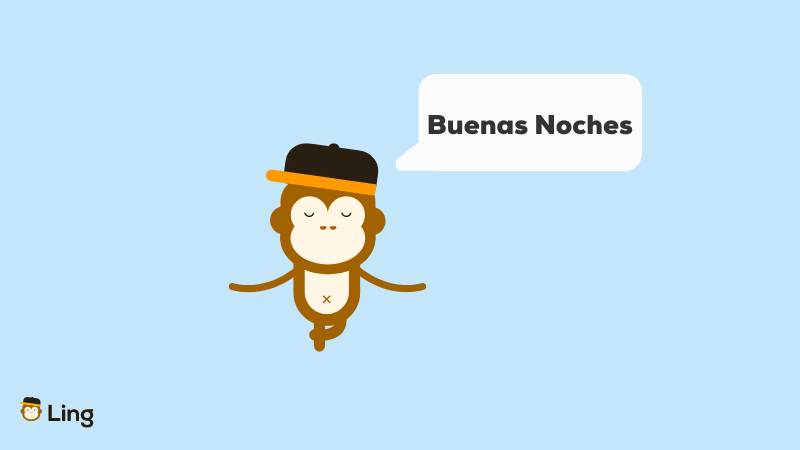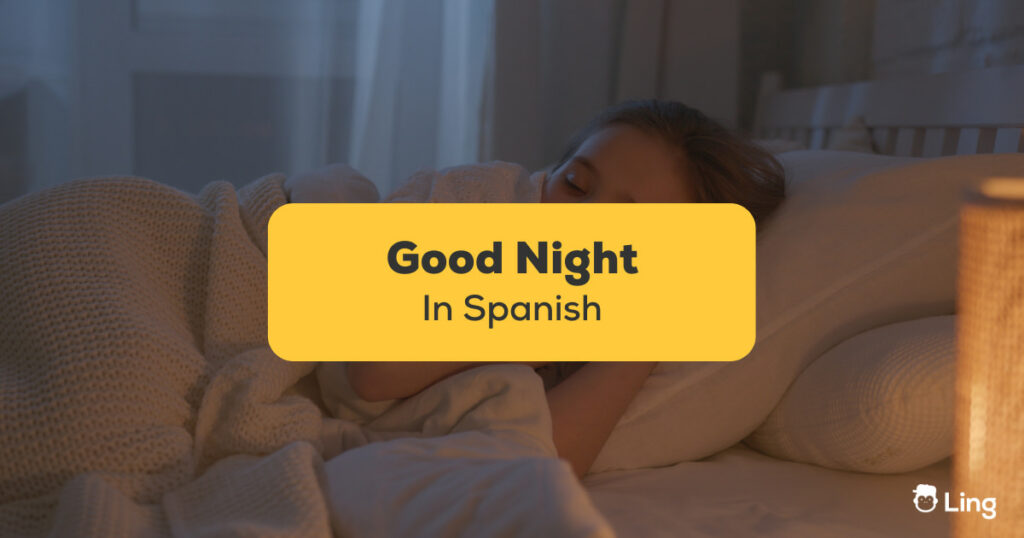Are you curious to know all the phrases you can use to wish someone a relaxing and restful good night in Spanish? Any native speaker will appreciate you hoping that they sleep well at night.
Wishing someone a good night is a polite greeting that expresses respect towards the other person. It is also a part of people’s manners, regardless of the culture. Since we are young, we are taught to say good night when separating from the other person in the evening or if we are going to sleep. It is an essential part of our vocabulary.
But there’s more than saying ‘good night,’ depending on the situation and the person you are talking to. There are many other ways you can choose to say it. Phrases that will make you sound like a pro in the Spanish language.
Master Saying Good Night In Spanish-speaking Countries
It is customary to wish a good night to people who are going to sleep or when one is going to sleep. It is not just a way to say goodbye but to hope that the other person has a good rest and stays healthy.
Before learning the phrases to say good night, let’s learn the verbs that you need to know for this lesson.
What Verbs You Should Know?
The verbs that you will commonly see and listen to while talking about how to wish someone sweet dreams in Spanish are the following:
- Dormir (Sleep)
- Descansar (Rest)
- Desear (Wish)
How To Say ‘Good Night’ In Spanish?
‘Buenas Noches’ is the literal translation to ‘good night,’ and you can use it in any situation with anyone as it is a formal and informal phrase.
People are accustomed to using this colloquial expression when saying farewell in the evening or the night before going to sleep.
Now, you might be wondering, why is it ‘Buenas noches’ in the plural and not ‘Buena noche’? This is something specific to the Spanish language.
If you wish someone good night by saying ‘Buena noche’ it will sound unnatural and incomplete since the phrase means ‘a good night.’ So, if you want to use this phrase, you can complete it by saying ‘Ten una buena noche’ (Have a good night).

Or, instead of using it as a greeting, you can also use this phrase to refer to how beautiful, peaceful, or pleasant the night is. For instance: ‘Esta ha sido una buena noche para mi’ (This has been a good night for me.)
All Alternatives To ‘Buenas Noches’

How Would You Respond If Someone Says Good Night To You?
When someone wishes you goodnight in Spanish, there are many phrases that you can use to respond.
Let’s begin with an example of an informal conversation among friends.
A: Ya me voy a dormir. (I will go to sleep now.)
B: Bueno, yo también ya me voy a dormir. (Ok, I will go to sleep too.)
A: ¡Buenas noches! (Good night!)
B: Que descanses. (Have a good rest)
So, you can answer with ‘que descanses’ to let the other people know that you wish them a good night of rest.
What if your friends or family members ask you if you are sleepy?
A: ¿Ya te vas a dormir? (Are you going to sleep?)
B: Si, tengo mucho sueño. Me voy a dormir. Buenas noches. (Yes, I am very sleepy. I am going to sleep. Good night.)
A: Está bien. Nos vemos mañana. Duerme bien también. (OK. See you tomorrow. You too sleep well.)
Now let’s look at a formal setting:
A: Estoy muy agotada. Voy a descansar. Que tenga una buena noche. (I’m so tired, I’m going to sleep. Have a good night.)
B: Gracias, que descanse. (Thank you, rest well.)

Real-Life Examples To Practice
Let’s see some phrases that you will be able to use to say goodnight in Spanish, answer if someone tells you ‘buenas noches’, or express whenever you are feeling tired.
Let’s begin!
Situation #1
A: Me iré a dormir antes que tú. (I’ll sleep ahead of you.)
B: Bueno. Buenas noches. Iré a dormir pronto también. (Ok. Good night. I will sleep soon too.)
A: Dulces sueños. (Sweet dreams/Sleep soundly.)
B: Dulces sueños para tí también. (Sweet dreams to you too.)
Situation #2
A: Vas a ir a dormir/Ya te vas a dormir? (Are you going to sleep?)
B: Si, ya me voy al sobre. (Yes, I’m going to bed already.)
- Note: The word ‘Sobre’ literally means ‘Envelope.’ However, as a slang expression in this context, it means ‘Bed.’ Since when getting into bed it looks as if we are putting ourselves in an envelope.
Situation #3
A: Me voy a la cama. (I’m going to bed.)
B: Que tengas dulces sueños. (Have sweet dreams.)
A: Buenas noches bebé. (Good night, babe.)
B: Duerme bien mi amor, sueña conmigo. (Sleep well my love. Dream of me.)
More sentences!
About being sleepy (Tener sueño):
- Tengo mucho sueño. Necesito descansar. (I’m very sleepy. I need to rest.)
- Tengo sueño, me voy a la cama. (I’m sleepy, I’m going to bed.)
- Me muero de sueño. (I’m extremely tired. – The literal translation is ‘I’m dying of sleepiness.’)
- Necesito un buen descanso. (I need to have a good rest.)
- Me caigo del sueño! (I’m falling asleep/I’m super tired.)
- Cayó rendida como un tronco. (She slept like a log.)
About going to sleep (Ir a dormir)
- Es hora de acostarse. (it’s bedtime/It’s time to sleep.)
- Es hora de ir a dormir. (It’s time to go to sleep.)
- Es hora de ir a la cama. (It’s time to go to bed.)
- ¡A la cama niños! (Go to bed children!)
- No puedo dormir. (I can’t sleep.)
- Vámos a la cama ya. (Let’s go to bed now.)
- Ponte el pijama/Ponte la pijama (Put on your pajamas/Put on your pajamas)
Wishing good night in spanish (Buenas noches!):
- Que tengas buenas noches. (Have a good night. – Informal)
- Que pases buenas noches. (Have a good night. – Informal)
- Espero que tenga buenas noches. (I hope you have a good night. – Formal)
- Que pasen buenas noches. (Have a good night. – Plural form)
- Espero que todos duerman bien esta noche. (I hope everyone sleeps well tonight.)
- Duerma bien. (Sleep well – Formal version of ‘duerme bien.’)
- ¡Hasta mañana con todos! (See you tomorrow everyone!)
- Nos vemos por la mañana. (See you in the morning.)
- Que duermas profundamente. (Sleep soundly.)
Extra sentences:
- ¿Pasaste una buena noche? (Did you have a good night?)
- ¡Me desperté por tus ronquidos! (I woke up because of your snoring!)
- Tuve una pesadilla anoche. (I had a nightmare last night.)
- ¿Me puedes despertar temprano mañana, por favor? (Can you please wake me up early in the morning?)
- Ya me voy a poner el pijama. (I’m gonna put on my pyjamas.)
- Te deseo una felíz noche. (I wish you a happy night.)
Ready To Say Buenas Noches?
Now you are all set to start wishing goodnight in Spanish. Just like saying ‘Buenas tardes’ (Good evening) or ‘Buenos días’ (Good morning), a ‘Buenas noches’ may make the day and night of the other person much better. Moreover, you can use any of the previously learned phrases to start practicing your intermediate and advanced language skills.
Are you eager to start speaking in Spanish like a local while traveling in a Spanish-speaking country? There is no other way more than talking and practicing as much as you can, but there are resources to help you along the way.

Practice More Spanish Vocabulary With Ling!
Ling app has helped many people, including me, learn a new language effectively. It is specially designed for people looking for an engaging and fun learning experience.
Its interactive lessons, engaging quizzes, and games will keep you hooked and motivated to complete the course and increase your language abilities.
Whether you want to communicate with friends and family or meet new people abroad while traveling, this app is ideal to begin your Spanish language learning journey!
Our users have praised Ling app for allowing them to build a solid language basis and learn essential daily life vocabulary. They also love to have the app accessible to start learning whenever they want.
Besides, our Ling Blog is constantly updating to share cultural facts, such as how Hispanic countries celebrate Christmas or Holy Week and key phrases you must know for traveling, transportation, professions, or verbs.
Curious to know how Ling will help you learn Spanish? Download the app from App Store and Play Store to begin your journey towards fluency.







